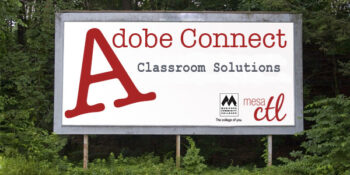Are you interested in conducting online live classroom sessions or office hours?
Adobe Connect is the premier resource for online live classroom and web conferencing solutions for eLearning and business applications. Their comprehensive product provides a safe platform for faculty to deliver virtual real-time class presentations and host office hours with features such as: screen and file sharing, video/audio capture, mobile device support, session recording, live polling and more!
Learn more about Adobe Connect features.
Mesa Community College has officially rolled Adobe Connect out of its pilot phase, and is issuing meeting host ‘seats’ to faculty interested in conducting online live classroom sessions. MCC shares meeting host ‘seats’ with the rest of MCCCD so only faculty who feel that they need this type of learning experience for their students should click the link below to decide if this is the right tool for their their course.
Join the community+ as we explore teaching and learning at MCC!
About the community: The CTL@MCC Google+ Community strives to bring together educators in higher ed to collaborate, share, learn, and innovate so that together we can improve student success and college completion. Join the conversation and help us celebrate excellence!


Calling all faculty! The “some day when we leave WebCT” is drawing near! It is finally time to leave the Jurassic Era that is WebCT and move into the 21st Century – enter, Canvas!
In September the governing board approved the RFP award for the new Learning Management System to a company called Instructure with their LMS, Canvas. MCC has been selected as the first Maricopa school to move to this new system. As part of the migration from WebCT to Canvas the CTL will run two different programs in an effort to work collaboratively with the college and the unique needs of each department and hopefully, ease the migration process for everyone. Currently we anticipate that all faculty will be using the Canvas system beginning Summer I, 2012.
Canvas Pioneer Program
Summary: The Canvas Pioneer Program is a voluntary program with no stipend given. Faculty that are teaching a late-start spring course beginning no earlier than March of 2012 may apply to this program. The 25-30 faculty that are selected will receive early training and access to the production system and will be the first faculty teaching within the new Canvas LMS. They will be asked to share feedback on their migration / transition to Canvas, they will be asked to complete a survey about the training, migration, and teaching process, and they will be asked to deliver a survey to their students asking for feedback.
Selection will be based on uniqueness, discipline/department, technologies, and teaching and learning techniques so that we may fully test as many aspects of the new system as possible. A variety of departments is desired so that we can ensure we test the system early with your departments unique online teaching and learning needs.
Canvas Pioneer Application for Late-Start Spring 2012: http://tinyurl.com/canvaspioneer
Applications will be accepted until November 17th, 2011 at 5pm.
Canvas Faculty Mentoring Program
Summary: The Canvas Faculty Mentoring Program is a program for residential faculty with a maximum stipend of $2000. The selected “faculty mentors” would be given training and access to the Canvas system first so that they could help support other faculty during the migration process. These mentors will be used to staff Canvas open labs and to be liasions within your departments to ensure that all faculty have the support they need during this transition. Currently we anticipate that all faculty will be using the Canvas system beginning Summer I, 2012.
Faculty Mentor responsibilities include:
- Completing Canvas and/or Quality Matters training sessions,
- Staffing 3 open labs a month from March 2012 through September 2012 (inclusive of summer)
- Communicating Canvas updates to their assigned departments/chairs.
Selection will be based on location/department/discipline, availability during the summer months, experience in the current LMS, and experience with the Quality Matters rubric.
Canvas Faculty Mentoring Application: http://tinyurl.com/canvasmentor
Applications will be accepted until November 17th, 2011 at 5pm.
Questions? Concerns? Please contact the CTL: ctl@mesacc.edu or 480-461-7331.
I’ve been reading Bob Cringely’s column ever since I discovered he was the person behind one of my favorite PBS documentaries, “Triumph of the Nerds” which is a history of personal computing. Last week he posted an article about how the later generations of our students who are beginning to perceive that there was no life prior to computers, perhaps much in the same way my generation perceives television. What will our children’s children be experiencing in their learning opportunities?
(more…)
Whilst working on some other projects at school, I wanted to finally post this to a searchable resource that instructors and other educators can use. This is a combination of my most two recent posts at my own website at Edutechnorama…
(more…)
After car-pooling with her to the MCC Red Mountain campus yesterday, Donna and I had a conversation that she encouraged me to write about in a blog post. So this one’s for you, Donna. 🙂
I’m currently enrolled in an educational psychology graduate class at ASU entitled “Fundamental Theories of Learning.” Tying it together with some of the technology skills and the environment I work in has been an excellent experience. In the class one of the papers we read was entitled “The Seven Sins of Memory” — based on the book of the same name written by Dr. Daniel L. Schacter from Harvard University.
(more…)



